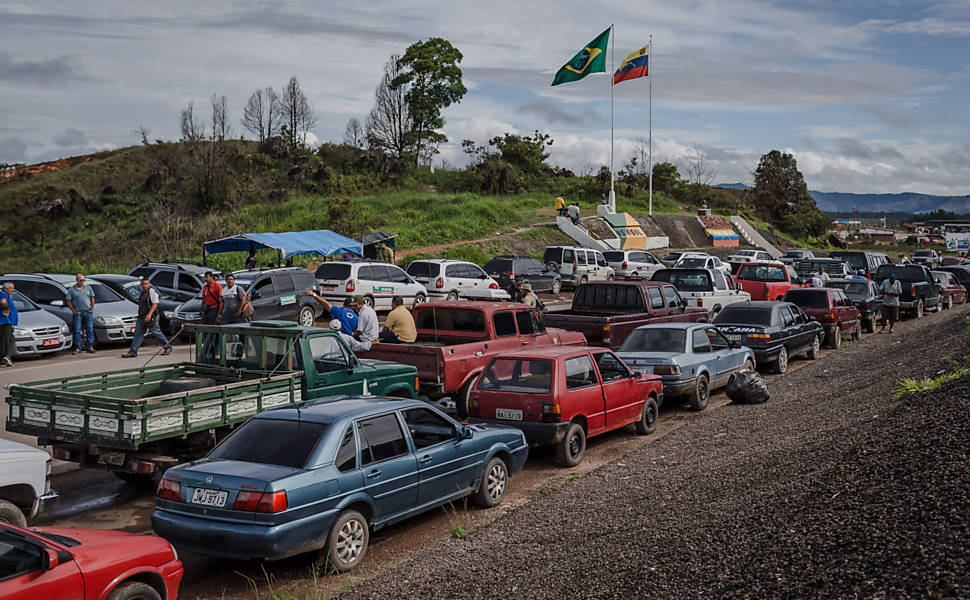Latest Photo Galleries
Brazilian Markets
17h38 Bovespa |
+1,50% | 126.526 |
16h43 Gold |
0,00% | 117 |
17h00 Dollar |
-0,93% | 5,1156 |
16h30 Euro |
+0,49% | 2,65250 |
ADVERTISING
Venezuelans 'Invade' City in Northern Brazil in Search of Food, Following Shortages in Their Own Country
07/22/2016 - 11h01
Advertising
ESTELITA HASS CARAZZAI
AVENER PRADO
SPECIAL ENVOYS TO RORAIMA
The Brazilian city of Pacaraima has been inundated with Venezuelans, many of whom have travelled for days in search of basic food items that are inaccessible in their own country.
The city in the Northern state of Roraima, on the border with Venezuela, has earned the nick-name "little 25 de Março", in reference to one of the busiest shopping streets in downtown São Paulo.
However, while Pacaraima has the frenzied chaos of São Paulo's commercial hub, it has nothing of the festive, market-place atmosphere.
For approximately two months the city has been flooded with Venezuelans desperately seeking basic provisions following extreme food shortages in their own country. Many have travelled hundreds of kilometres just for a bag of rice.
The streets are strewn with weary travellers, resting on huge parcels: sacks of sugar and flour; cans of oil. They know these are burdens they will have to shoulder on their long ride home, journeys that could, for some, last up to two days.
"I came here because over there, there is nothing," said 39-year old Andrea Lamboz, who journeyed a gruelling 12 hours by bus to reach the city.
"There [in Venezuela] we need to queue up outside the shops in the afternoon to make sure we can get in the next morning. And even then you run the risk of finding all the shelves are empty."
The majority come, like Andrea, by bus, crossing the border on foot. Currently, no authorisation is needed to cross the Venezuelan-Brazilian border. The two counties are linked by a motorway, which is dotted with police checkpoints patrolled by officers.
The Venezuelans carry satchels, rucksacks and suitcases full of cash. Some wear calculators on strings round their necks: they know they will be dealing with large and complicated figures.
At the moment, one Venezuelan bolivar is the equivalent of less than one Brazilian cent. One bag of rice costs 1,000 bolivars. That explains the wads of banknotes. Suitcases, once chock-full of money, go back over the border stuffed with food. In the shops, Venezuelan coins and notes are kept in humongous sacks.
"I consider myself lucky to be here: not everybody can afford to make it," said 53-year old Ingrid López. The Venezuelan travelled nearly 1,000 kilometres to reach Pacaraima. She spent R$600 (US$ 185) on food for four families, almost 200,000 bolivars, or the equivalent of six months average salary. The food will only last one month.
"In my city we eat mangoes, because they grow on trees! Mango soup, cooked mango. All sorts of new variations: my kitchen has become a testing lab," she said.
Venezuelans are also flooding neighbouring Colombia in search of basic items. The Venezuela-Colombia border was closed in August following orders from the Venezuelan President Nicolás Maduro. He claimed it was necessary to limit movement between the countries in order to tackle smuggling .
Since then the border has been opened twice: on July 10 and overnight between July 16 and 17. On both occasions Colombia witnessed an influx of Venezuelans, with 35,000 and more than 100,000 crossing over respectively.
Two months prior to this, the government authorised entry of food bought in Brazil. And that was the start of the pilgrimages to Pacaraima.
The phenomenon has meant a sudden flurry of activity for the sleepy border city of just 12,000 inhabitants: makeshift shops have been hastily opened, some boasting little more than a table and a cash till.
Provisions are piled up in the middle of the floor, or left stacked against the shop windows. Even small boutique businesses and pharmacies have joined in the retail frenzy, staying open late into the night and at weekends.
Many locals are worried about the effects these developments are having on the city: mounds of rubbish in the streets, rising petty crime and increases in food prices.
"I'm not happy to be selling more, because we can see prices shooting up. Rising costs, more waste, more hassle," says 39 year-old Leidimar Torquato, the partner in a small business.
Leidimar has even been forced to pull down the shutters and close up shop on some occasions, when crowds have become too much to deal with. Queues stretched round the block. Shelves were bare - there was no time to unload boxes of goods before they were snatched up by eager shoppers.
For the moment, frantic shopping continues in Pacaraima. But the big fear now among Venezuelans is that Maduro will close the border with Brazil, leaving them even more short of options.
Translated by GILLIAN SOPHIE HARRIS




